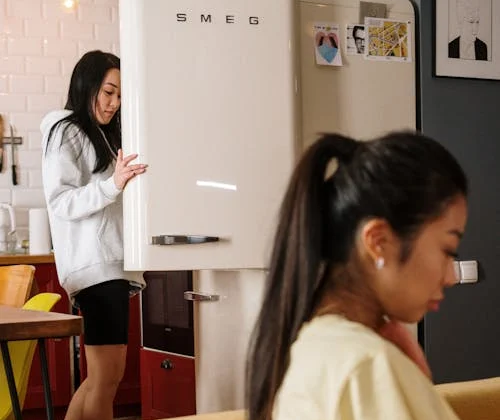For years, I prided myself on filling our fridge with home-cooked meals. It was my love language, a way to care for my family, even as life evolved and our children grew up and moved out. With just Thomas, my husband, and me at home, I imagined our fridge would last us several days—plenty of hearty meals for two.
But reality didn’t match my expectations. Every time I returned from work, the fridge was empty. Containers I had carefully filled with soups, casseroles, and other dishes were scraped clean, leaving me wondering what on earth was happening.
At first, I chalked it up to Thomas’s appetite. Maybe he was eating more than I thought? When I asked him about it, his answers were vague, brushing off my concerns with comments like, “I was hungry,” or “I didn’t realize I’d eaten that much.”
Working 12-hour shifts as a nurse left me too tired to dig deeper. I told myself it wasn’t worth arguing about—until the day I came home early and discovered the shocking truth.
A Fridge That Never Stayed Full
This wasn’t just an occasional occurrence. It happened week after week. I’d prepare full meals, confident that I was setting us up for days of easy, healthy eating, only to find the fridge practically empty by the time I came home.
I started to feel frustrated and unappreciated. It wasn’t just the time and effort I put into cooking—it was the confusion. How could so much food vanish so quickly?
I voiced my concerns to Thomas more than once. “Where does all the food go?” I’d ask, hoping for a reasonable explanation. But his answers were always the same:
“I just got hungry.”
“It didn’t seem like that much.”
“You know I love your cooking!”
While his words were flattering, they didn’t explain the sheer volume of food disappearing. Was he eating multiple meals a day? Throwing leftovers out for some reason? Nothing added up.
An Early Return Reveals the Truth
Then, one evening, everything changed.
I wasn’t feeling well at work, so I left my shift early and arrived home much earlier than usual. As I stepped into the house, I was greeted by blaring music and the unmistakable hum of people talking and laughing. My heart sank.
In the kitchen, the sight stopped me cold.
A group of young men, about six of them, were sitting around the dining table, laughing and eating—eating the food I’d spent hours preparing. Thomas stood among them, plating up more of my carefully cooked meals, seemingly hosting a party I knew nothing about.
“WHAT THE HELL ARE YOU DOING?!” My voice cut through the music, freezing everyone in place.
The Shocking Explanation
Thomas turned to me, guilt written all over his face. The guys looked sheepish but stayed silent, waiting for him to speak.
“Emily, I can explain,” Thomas began, but his hesitation told me he hadn’t expected to get caught.
It turned out that for months, Thomas had been hosting gatherings for these young men, most of whom were new to town and struggling financially. He’d met them at a local community center and decided to help by sharing our food.
“You’re feeding them our food?” I said, my voice trembling with anger and disbelief.
“They didn’t have anywhere else to go,” Thomas replied. “Some of them are barely getting by. I didn’t know how to tell you, but I didn’t want to turn them away.”
A Mix of Anger and Compassion
I was furious—furious at Thomas for keeping this from me, for letting me work long shifts thinking I was cooking for us while he gave it all away without a word. But at the same time, I couldn’t ignore the looks on the young men’s faces: embarrassed, grateful, and a little afraid.
It was hard to stay angry when I realized they genuinely needed the help. Still, I couldn’t let things continue as they were.
“We’ll talk about this later,” I said firmly, before turning to the young men. “Finish eating, and then we’ll figure out a better way to do this.”
Finding a New Solution
That night, after everyone had left, Thomas and I had a long conversation. I told him how betrayed I felt by his secrecy. He admitted he’d been wrong not to tell me but insisted he’d only wanted to help.
Eventually, we found a compromise. I agreed to cook extra meals specifically for Thomas’s new friends, but only if he told me in advance how much food was needed and helped with the cooking. In return, he promised never to hide anything from me again.
A Lesson in Honesty
Looking back, I learned an important lesson about communication and compassion. While I was angry at first, I realized Thomas had good intentions. By working together, we found a way to support others without sacrificing our own needs.
Now, our kitchen is not only a place for meals but also a space for building community—and this time, with full honesty and transparency.
